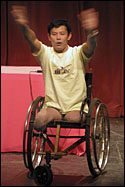Ottawa treaty five years on
Despite the signing by 125 countries of the Ottawa treaty five years ago that banned their use, landmines continue to be laid all over the world. Forty-eight countries still have not signed the treaty, including India and Pakistan, where untold thousands of mines are being placed in the disputed Kashmir region. Raising awareness of the issue and putting pressure on non-signatory countries was the object of a December 3 conference held at McGill.
 Nobel winner Tun Channareth
Nobel winner Tun ChannarethPHOTO: Owen Egan |
|
Hosted by the McGill chapter of Engineers Without Borders and co-sponsored by UNICEF and Mines Action Canada, the event was part of a cross-country effort to raise awareness of how the problem of landmines continues.
Torn by years of civil war, Cambodia at one point had nearly as many landmines as people -- 10 million mines in a country of 12 million. The number of mines is now 6 million, yet Cambodians live with their effects still.
Tun Channareth is one of those -- his story is not for the squeamish. Channareth was injured by a landmine when he was 17 years old and had to cut off his own legs so a friend could carry him to a medical outpost. He gets around in a wheelchair now, but his energy and vigour remain undiminished.
In a rapid-fire delivery to a small crowd in Moyse hall, Channareth told his life story -- a story that took him from a refugee camp, to working in a wheelchair manufacturing shop, and finally to his activism. This latter endeavour started with a petition to ban landmines that garnered hundreds of thousands of signatures in his country. He met with the Pope, travelled to Europe and Canada, and finally to Norway, where he proudly accepted the Nobel Peace Prize on behalf of the International Campaign to Ban Landmines. His work isn't done, he cautioned.
"I went to London for Jubilee 2000 and they clapped and said congratulations, 'You've done your job.' I said 'No! You're confused -- we're still looking after victims and after survivors and that's what I'm here to tell you,'" he said.
Fellow Cambodian Song Kosal may still be a teenager, but she is a veteran of the anti-landmine campaign. Addressing the audience in Khmer while Sok Eng from the Cambodian Campaign to Ban Landmines translated, Kosal told how she lost her leg while gathering firewood with her mother when she was only five years old.
"When I grew up I was ashamed of my body with only one leg, and I was sad I couldn't play with other children," said Kosal, whose amputation is too high for a prosthetic limb.
Kosal went on to found Youth Against War, and was present at the signing of the Ottawa Treaty.
For her part, Eng focuses on helping victims of landmines in her country.
"In Canada you are safe -- you don't know how strong, how loud an explosion is," she said.
Earlier in the day EWB hosted a roundtable discussion with Nancy Ingram from Mines Action Canada, Faiz Mohammed Fayyaz of the Pakistani Campaign to Ban Landmines, and Balkrishna Kurvey, his opposite number in India.
"We must pressure the government of India to stop the use of this inhuman weapon," said Kurvey, adding that Canada could still play a vital role in convincing India to sign.
"My government is very afraid of international criticism -- the opinion of non-resident Indians is very much considered by my government."
Ingram explained that a petition is being circulated world-wide that will be presented simultaneously to the governments of the two countries next year. It can be viewed at www.icbl.org.

